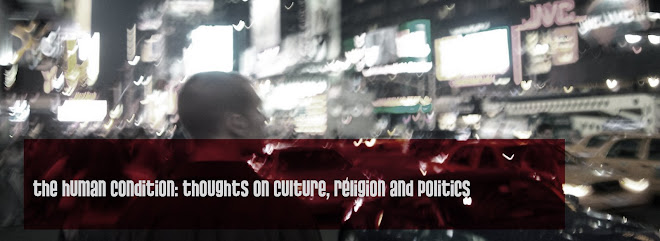For the past few years I have struggled to formulate a way to explain how I see the world. What I have had are chunks and pieces of things I believe, but not a way to put them all together into one complete picture or worldview. I was envious of people whom, even though I believed it was a mistake, bought into and ideological system, because at the very least they could explain their view of the world in an orderly and systemized way. I, on the other hand, believed in a theory here and a theory there, but overall felt all over the map. However, now, I am hoping that this has finally changed.
Over the course of my years reading and thinking and blogging I, like many other thinkers and writers, have been trying to view the world in a way that transcends liberal and conservative, and religious and secular. And I believe that I have found a way to do this that makes the most sense, at least to me. This is my first attempt at really putting what's been going on in my head into words, and I'm doing this as much for myself as for anyone interested in reading. A lot of what I'll say isn't new, but the way I am going to present it is (or at least it is to me). So with that, I will begin.
I'll start by saying what I've pointed out on my other blog-- that all reality is made up of things are whole, yet are also parts e.g. atoms, molecules, cells etc. all the way up to us. And just like the rest of reality, we indeed make up something as well-- society. Or still more accurately, we make up the things that make up society-- social institutions. The five social institutions (SI's) are the institutions that have made up every civilization ever studied, and they are: Government, Economy, Education, Family and Religion. This is incredibly significant, and is no coincidence. Spanning all cultures, human beings, when forming a society always have the same basic institutions. With that said, if we think of society like one big organism, or social organism (SO) as coined by Durkheim, then would it not make sense that SI's function and work together just like other systems within an organism (e.g. our organ systems) do?
If the answer is yes, then it becomes clear that it is a mistake to, as people often do, champion one's preferred SI as the solution to all of society's ills. For example, in left v.s. right debates, the left often insists that government involvement or social programs are what is needed to fix society, while the right argues that less government involvement with the free-market is what is needed. Thus one sided argues for government while the other for the economy. Yet, in other debates one might often hear the preservation of the family as the key to fixing society. Still in other circles, you'll find education being touted as the cure-all for society's ills. And finally, and more frequently, I hear that the church as the solution. The church, the argument goes, has ignored its role at taking care of the poor, the sick and the widow and handed that responsibility over to government.
However, in viewing society as an organism, all of these parts come together, and each SI becomes integral for social change and betterment. It is reductionistic to focus upon one SI, for the SO is more than the sum of its parts. Indeed, I think it is possible that some SI's mirror our own organ systems functioning very similarly in the SO, and that the best lens for comprehending society is to view it how we would any other organism. Thus, arguing that one SI be removed or tremendously minimized to fix social problems, is akin to arguing for the removal of one of our own organ systems to cure our body.
The question of how I think the SI's function in a SO, will be discussed from here on out. I have virtually this whole series done; I just need to edit sections before I post them. Government, Economy and Education will be next, with Religion, Family and Culture after that.

No comments:
Post a Comment